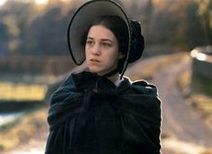
Behold, my favorite Jane Eyre: French actress Charlotte Gainsbourg, from the '96 movie version. Doesn't she just look the part perfectly? (cultural tangent: Gainsbourg's father is French icon/musician Serge Gainsbourg. Feel free to enhance your potential hipster quotient by watching this classic Serge/Brigitte Bardot video: http://www.youtube.com/watch?v=nB112Vbl8-A. You'll thank me when you're the coolest kid in college).
Blog Assignment
Please read the following extremely brief article:
The Position of Victorian Middle Class Women
http://www.victorianweb.org/authors/bronte/cbronte/73cbwomen.html
Respond:
In the blog comments, please write a post that answers the following
question (s):
1. How does social class affect Jane in Chapters 14-17, specifically her
interactions with and reactions to Rochester, Blanche Ingram and her cohort? Analyze the
struggle that arises between Jane's sense of individuality and independence, and
the obligation she feels to "be good" and follow the rules of social class set
out by Victorian society.
2. Length: 2 paragraphs. Must include at least one direct quote, properly cited.
3. Please also reply to at least one of your classmate's comments.
DUE: Friday morning 1/9, by 7am (so, basically, do it for HW tonight!)
I look forward to reading your thoughts!
 RSS Feed
RSS Feed